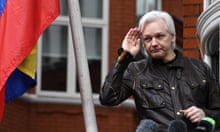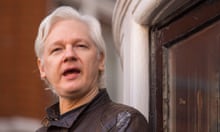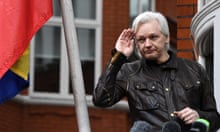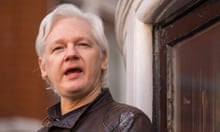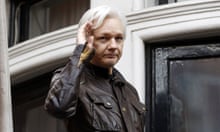Julian Assange will continue to face detention if he leaves the Ecuadorian embassy in London after a British judge upheld a warrant for his arrest.
Handing down her judgment at Westminster magistrates court, the senior district judge Emma Arbuthnot said she was not persuaded by the argument from Assange’s legal team that it was not in the public interest to pursue him for skipping bail.
She said: “I find arrest is a proportionate response even though Mr Assange has restricted his own freedom for a number of years.
“Defendants on bail up and down the country, and requested persons facing extradition, come to court to face the consequences of their own choices. He should have the courage to do the same. It is certainly not against the public interest to proceed.”
Assange, 46, skipped bail to enter the embassy in 2012 to avoid extradition to Sweden over allegations of sexual assault and rape, which he denies.
Though Swedish prosecutors dropped the investigation against him, he faces arrest if he leaves the building in Knightsbridge, west London, for breaching his former bail conditions in the UK.
Lawyers for the WikiLeaks founder had asked for the warrant to be withdrawn since Sweden no longer wants him extradited, but the judge rejected their request last week. Representing Assange, Mark Summers QC went on to argue that arresting him was no longer proportionate or in the public interest.
Summers said that the years Assange has spent inside the embassy were “adequate, if not severe” punishment for his actions, and cited a report by a UN committee that said the Australian national was being arbitrarily detained.
But the judge said on Tuesday: “Firstly, he can leave the embassy whenever he wishes; secondly, he is free to receive, it would seem, an unlimited number of visitors and those visits are not supervised; thirdly, he can choose the food he eats, the time he sleeps and exercises.
“He can sit on the balcony (I accept probably observed by the police and his supporters) to take the air. He is not locked in at night.
“I suspect if one were to ask one of the men incarcerated in Wandsworth prison whether conditions in the Ecuadorian embassy were akin to a remand in custody, the prisoner would dispute the working group’s assertions.”
Summers also argued Assange was justified in seeking refuge in the embassy because he had a legitimate fear that US authorities were seeking to arrest him for WikiLeaks’ publication of secret documents.
He said Assange had made attempts to cooperate with the investigation in Sweden but had been refused, and that emails uncovered by a freedom of information (FoI) request showed the Swedish prosecutor had been advised by a case lawyer at the Crown Prosecution Service that Assange should be interviewed in Sweden.
“It [the correspondence] records that the CPS had already advised that it would not be prudent for Sweden to try to interview Mr Assange in the UK,” he said.
In October 2013, Summers added, Sweden advised the CPS lawyer that it was time to withdraw the European arrest warrant on the grounds of proportionality, but it was four years before it eventually was.
“Obviously these emails are of interest to the court,” Arbuthnot said last week. But on Tuesday she said: “I accept that Mr Assange had expressed fears of being returned to the United States from a very early stage in the Swedish extradition proceedings but, absent any evidence from Mr Assange on oath, I do not find that Mr Assange’s fears were reasonable.
“I do not accept that Sweden would have rendered Mr Assange to the United States.
“If that happened there would have been a diplomatic crisis between the United Kingdom, Sweden and the United States which would have affected international relationships and extradition proceedings between the states.”
Assange also suspects there is a secret US grand jury indictment against him and American authorities will seek his extradition.
Assange’s lawyer Jennifer Robinson said before Tuesday’s hearing that the US government had made clear its intention to bring a prosecution against WikiLeaks.
“The UK FCO [Foreign and Commonwealth Office] refuses to confirm or deny whether there is an extradition request for Mr Assange,” she said. “In our recent FoI challenge against the CPS [...] the CPS refused to disclose certain material because it would ‘tip off’ Mr Assange about a possible US extradition request. It is time to acknowledge what the real issue is and has always been in this case: the risk of extradition to the US.”
Gareth Peirce, one of Assange’s legal team, said it would be possible to appeal against the decision.
Speaking outside the court, she said: “Whether it is pursued is another question. The history of the case from start to finish is extraordinary. Each aspect of it becomes puzzling and troubling as it is scrutinised.”


